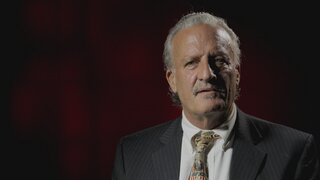Create a free profile to get unlimited access to exclusive videos, breaking news, sweepstakes, and more!
Woman Allegedly Orchestrates Husband’s Murder For Insurance Money, Uses Stepdaughter As Alibi
Werner Hartmann's daughter Eva found her father's bullet-riddled body after her stepmother, Debra Hartmann, insisted they go out dancing all night.
Werner Hartmann came to American seeking happiness and fortune — and while that did happen, he found it along with heartbreak, betrayal, and death.
Born in 1944, Werner grew up in the ruins of post-World War II Germany. He moved to Florida at the age of 19, where he met Vasiliki Cruse. They married in 1964; daughter Stephanie was born a year later and another girl, Eva, followed in 1967.
In 1966, the Hartmanns moved to Chicago where they opened up a store that sold and installed car stereos. It was a huge success, and Werner became known as the “stereo king of Chicago.”
“Everyone loved him, his laugh, his smile. Beautiful blue eyes that just lit up the room. Very sociable, very friendly,” daughter Eva Hartmann told Oxygen’s “Snapped,” airing Sundays at 6/5c on Oxygen.
The Hartmanns lived the good life. They moved to a luxurious home in the exclusive Northbrook suburb, went on expensive vacations, and ate at the best restaurants. But things took a turn and the pair divorced in 1977, though they remained on good terms. Cruse moved back to Florida and took the girls with her.
Newly single and living alone, Werner spent his free time bar hopping and going to nightclubs. In 1978, he met 24-year-old dancer Debra Stover at a Chicago strip club.
Debra grew up in an abusive home and quit school at 15. She lived on her own and survived by her wits and charisma.
“Debra could charm men. She had a thing. She was good at it. She knew how to do it,” Eva told producers. She certainly charmed Werner. They were married two months after meeting.
Cruse and the girls moved back to the Chicago area the following year to see more of their father, and they spent time with Debra as well.
On June 8, 1982, Eva, her mother, and Debra had a girls night out. They went to dinner and then dancing at Debra’s insistence, even though it took awhile to find a nightclub that would let them in since Eva was only 14.
Cruse dropped Eva and Debra off at Werner's residence around 4.am. “We walked into the house, the music was playing so loud, my Dad’s music. That was not normal,” Eva told “Snapped.”
Eva went to the second floor to investigate, which is where she found her father’s dead body. Werner was naked with bullet wounds running from his face to his naval, the United Press International reported at the time.
Eva wanted to call 911, but Debra said they needed to go straight to the Northbrook Police Department. Then, at the station house, Debra said something odd: She claimed Werner had committed suicide.
“We found Werner Hartmann laying on his back, obviously shot up, full of bullet holes. It was very apparent this was not a suicide,” former Northbrook Police Officer Neil Calanca told producers.
An autopsy determined he had been shot at least 14 times by an automatic weapon, according to court documents. The murder weapon was later identified as a Military Armament Corporation Model 10, commonly known as a “MAC 10.”
There were no signs of a break-in or robbery and no fingerprints were found at the scene. Inside, detectives found piles of unpaid bills for the mortgage, utilities, and car payments.
At the station house, Debra told investigators Werner’s business was failing and the couple was spending more than they were making. She feared her husband had gotten a loan from someone involved with organized crime and that they had killed him.
Detectives didn’t buy it.
“First of all, if it was a mob hit, it wouldn't be that messy,” Calanca told producers. “Secondly, mob guys are in business, right? So let’s say Werner did borrow money from the mob, if they kill Werner, they're never going to get any money.”
Investigators notified Cruse, who told them Werner had asked her to return to Chicago to help run his business. When she opened the books, she was shocked by the amount of debt Werner and Debra had run up.
“Debra would show up, get money out of the cash register, and then leave. She went to New York with her girlfriends, spent thousands of dollars, started going out to nightclubs,” Eva told producers.
Werner had also told Cruse Debra was cheating on him with a man named John Korabik. Werner initially tolerated the affair, but when it became clear it was more than just a fling, he had filed for divorce.
Another shocking clue came when Werner’s attorney, Richard Colombik, contacted police to alert them about a recent conversation with his client.
“He called and goes, ‘Mr. Colombik, I’m scared,’" Colombik told producers. “‘I overheard my wife and her boyfriend talking. They didn’t know I was there and they were talking about how to kill me.'"
Detectives also learned Debra stood to inherit almost $1 million in her husband’s death. She immediately became the prime suspect in Werner’s murder — but when they next tried to interview her, she had lawyered up.
While the case grew cold, Debra took possession of Werner’s homes and personal property. She also tried to claim $800,000 in life insurance policies, but suspecting fraud, the insurer refused to pay. They settled with her for $450,000, according to court documents.
Debra broke up with Korabik nine months later.
Then, a major break came in the case. In 1984, ATF agents arrested career criminal Kenneth Kaenel for illegally selling firearms. In undercover recordings, Kaenel bragged about using a MAC 10 machine gun, according to court documents.
This was especially relevant because Kaenel had previously lived with Korabik and Debra at Korabik's father’s home in Chicago. When detectives questioned Kaenel in jail, he agreed to talk to them on the condition that "nothing he said would be used against him," according to court documents.
Kaenel claimed he was offered $50,000 to kill Werner Hartmann and that Korabik supplied him with the MAC 10 — but he said he turned down the job after test firing the gun in his basement because it malfunctioned.
Bullet slugs dug out of Kaenel`s basement were eventually matched to those taken from Werner's body, The Chicago Tribune reported in 1988.
Detectives asked Kaenel to wear a wire and get Debra to incriminate herself. However, when he went to speak to her he signaled that they were being recorded, rendering the conversation useless and nullifying his deal with police.
Without enough evidence to make an arrest for murder, investigators began building a fraud case against Debra and her co-conspirators. Handwriting experts determined Werner’s signature had been forged on life insurance documents, according to the Chicago Tribune.
But in order to commit insurance fraud, Debra would have needed a willing conspirator at the insurance company. Phone records implicated Harvey Loochtan, the Hartmanns' insurance agent.
When confronted by police at his office, Loochtan immediately told them everything. He said Werner had contacted him in 1982 to say he was getting a divorce and wanted to take Debra off his life insurance policy and make his daughters the sole beneficiary.
Not long after, Loochtan was visited by Debra, who worked her charms and persuaded him to make her the sole beneficiary. She also gave him $3,000, according to court documents.
After Loochtan approved the policy, a copy was sent to Werner, who called to complain that the changes he requested weren’t made. Loochtan warned Debra, and Werner was murdered days later.
“I think if he never would have changed the policy, my dad would never have been murdered,” Eva told producers.
Authorities finally made an arrest on Jan. 21, 1989, almost seven years after Werner Hartmann’s death. Debra Hartmann, John Korabik, and Kenneth Kaenel were indicted on charges of mail fraud and conspiracy, the Associated Press reported at the time.
In Dec. 1989, Debra Hartmann, John Korabik, and Kenneth Kaenel were convicted on multiple mail and wire fraud charges for conspiring to kill Werner Hartmann and cheat life insurance companies out of $800,000, according to a 1989 Chicago Tribune article.
Three months later, in March 1990, Debra, then 35, was sentenced to 22 years in prison. Having ultimately collected $589,000 in insurance settlements, she was ordered to pay whatever restitution was possible, the Chicago Tribune reported at the time.
John Korabik, 34, received a 16-year prison sentence, while Kenneth Kaenel, who at 62 was already serving six years for illegal gun sales and stolen car possession, was given an additional 20-year sentence. Harvey Loochtan, 52, was sentenced to two years in prison.
Tragically, no one has ever been charged with the murder of Werner Hartmann and it remains an open case. Debra was released in 2002 after serving 12 years in prison. Her current whereabouts are unknown.
To learn more about this case and others, watch Oxygen’s “Snapped,” airing Sundays at 6/5c on Oxygen or stream episodes on Oxygen.com.























